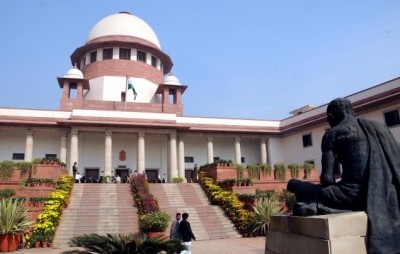
New Delhi, The Supreme Court is scheduled to pronounce its judgment on Monday on a clutch of petitions challenging the validity of the 103rd Constitution amendment, providing 10 per cent reservation to economically weaker sections (EWS) persons in admissions and government jobs.
A five-judge Constitution bench, headed by Chief Justice U.U. Lalit and also comprising Justices Dinesh Maheshwari, S. Ravindra Bhat, Bela M. Trivedi and J.B. Pardiwala had reserved the judgment on September 27.
The marathon hearing in the case lasted for nearly seven days, where a battery of senior lawyers argued for the petitioners and(then) Attorney General K.K. Venugopal and Solicitor General Tushar Mehta defended the EWS quota.
In the rejoinder arguments, legal scholar Dr. G Mohan Gopal, representing one of the petitioners, argued that socially and educationally backward class was a category, which united all categories as backward classes - based on social, economic, and political backwardness. He contended that compartmentalisation of classes, the quality of forwardness being required as a prerequisite for granting reservations opposed the basic structure of the Constitution.
Earlier, Gopal had argued that the 103rd amendment is a fraud on the Constitution and the ground reality is that it is dividing the country along caste lines. He emphasised that the amendment is an attack on the constitutional vision of social justice and in his state, which is Kerala, he is not happy to say that the government issued an order for EWS and the title was 'caste' and they were all most privileged castes in the country.
Senior advocate P. Wilson argued that Article 15(4) & 16(4) are enabling provisions to grant reservations which are affirmative action to offset centuries of social discrimination and promote equality. The 103rd Amendment nullifies and destroys the substantive equality sought to be achieved by Article 15(4) & 16(4) & takes SC/ST/OBC's back to pre-Constitution condition in the society, he added.
"In Indra Sawhney, this court has held that reservations based on economic criteria will lead to virtual deletion of Art 15(4) and 16(4)," he said.
A senior counsel argued that the Centre had not provided the nexus between reservation and poverty or explained why other benefits instead of reservations could not be granted to EWS. Another counsel argued against the compartmentalisation of classes and submitted that the 50 per cent ceiling limit was sacrosanct and violating it would be a shocking infringement of the basic structure, and also something inflexible could also be basic structure.
Attorney General. Venugopal, representing the Centre, had submitted that SCs and STs have been given benefits by way of affirmative action -- given reservation in promotion in government jobs, legislature, panchayat and municipalities -- and the EWS quota does not violate the basic structure of the Constitution, as he defended the 103rd constitutional amendment.
He added that the EWS quota has been given without disturbing the 50 per cent quota, which is meant for the socially and economically backward classes (SEBC). The AG added that backward classes including the SCs, STs, and OBCs each contained economically weaker sections within themselves, and also the general category consisted of economically weaker sections, which were grossly poor. The AG contended that SCs, STs and OBCs quota is self-contained sections of backwardness and the EWS quota is separate.


.jpeg)

